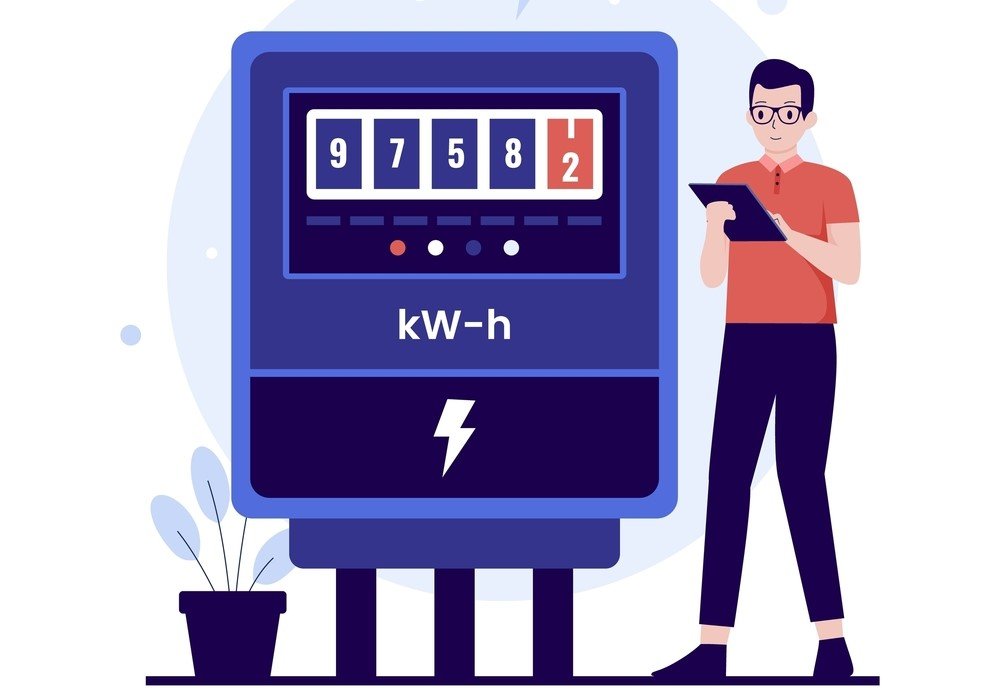You might have stumbled upon questions about Watt (W), Kilowatt ( kW), Kilowatt-Hours (kWh), and Megawatt Hours (Mwh) thinking about how they link to each other and influence the cost of your electricity bills. The term “Kilo (K)” refers to “thousand” and “Watt (W)” and is named after the Scottish engineer “James Watt” to specify the SI unit of power. Also, the term “Watt-hour (Wh)” means the measurement of energy produced or consumed per hour.
In simpler terms, A Watt (W) is a basic unit of power required for any electrical appliance to perform work at the rate of 1 joule per second. Whereas, Kilowatt-Hours(kWh) stands for Kilowatt hour which can be defined as the electricity consumption rate by the appliances at a common point in a specific time.
You might commonly observe the term kW on electrical appliances in your daily lives, including air conditioners, light bulbs, fans, refrigerators, and several others, whereas kWh impacts your energy bills.
The main difference between kW and kWh matters greatly in understanding the concept of measuring power and energy consumption. Generally, to express electricity in terms of power the measurement is known as Kilowatt (kW), and to measure how much energy is used at your home or business areas in a day it is Kilowatt-hours (kWh).
It is mandatory to know the difference between kW and kWh, which can be helpful for you to have a brief idea about how to calculate your electricity consumption and estimate your electricity bills. As a result, you can reduce the electricity usage at peak hours, measured in kW, compared to the normal usage calculated in kWh.
What is Kilowatt(kW)?
Typically, a kilowatt (kW) represents a rate of energy transfer per unit time. 1Kw is equal to the 1000 watts of power generated.
You might require more electrical power to operate a higher kW of a device. Scientifically, 1 kW is a measure of power which is equivalent to 1000 joules per second. In other words, it means that a device having a power rating of 1 Kilowatt can transfer an energy of 1,000 joules per second.
How to Calculate Kilowatt(kW)?
It is straightforward to calculate the kilowatt of any appliance by using the simple equation, that follows by dividing the power (Watts) by 1000:
Kilowatt (kW) = Power in Watts of any appliance/1000
Let us consider a solar panel that has a power rating between 250 and 400W. By calculating the power of a 400W solar panel in Kilowatts(kW), we get:
Kilowatt (kW) = 400 Watts/1000 = 0.4kW capacity of a solar panel
Hence, you will need a 0.4 Kilowatt solar panel to run at least one of the basic home appliances.
Examples of Kilowatt in everyday life:
Here are some best examples of Kilowatts that vary according to the different basic appliances in everyday life:
- Microwave Oven: 1 kW ( 1,000 Watts)
- Refrigerator: 0.3kW ( 300 Watts)
- Generator: 5 to 7.5 kW
- Bulb: 0.1 kW ( 100 Watts)
- Fan: 0.075kW
- AC: 3 kW (3,000 Watts)
- LED TV: 0.09 Kw (90 Watts)
How to Calculate Kilowatt-Hours(kWh)?

A simple equation is used to calculate Kilowatt-hours by multiplying the number of working hours by the kilowatt of an appliance.
Kilowatt-hours (kWh) = (Kilowatt of an appliance) x (Number of hours used)
Let’s make the concept clear by considering the example of a solar panel that produces an output of 350 watts and runs for an average sunlight duration of 6 hours during the day:
Kilowatt-hours (kWh) = 350 x 6/1000 =2.1 kWh
From the above calculation, a solar panel can generate a power output of 2.1 kWh per day approximately.
Examples of Kilowatt-Hours (kWh) in everyday life:
There are many examples of Kilowatt-hours in everyday life and different appliances produce unique values according to the varied power and time usage:
- Dishwasher: 1 kW x 1 hour = 1 kWh per day
- 60-inch LED TV: 0.085 kW x 10 hours =0.85 kWh per day
- Fan: 0.075 kW x 20 hours = 1.5 kWh per day
- Refrigerator: 0.3 kW x 24 hours = 7.2 kWh per day
- AC: 3kW x 5 hours =15 kWh per day
- Phone charging: 0.01kWh x 1 hour = 0.1kWh per day
- Microwave oven: 1kWh x 2 hours= 2 kWh per day
What is the major difference between Kilowatt(kW) and Kilowatt hour (kWh)?
Here is the detailed difference between Kilowatt(kW) vs Kilowatt hour(kWh) tabulated below:
| Difference | Kilowatt (kW) | Kilowatt-hour (kWh) |
| Definition | A unit for measuring the power of any electrical appliance | A unit for measuring energy |
| Units | 1 kW= 1000 W | 1kWh= 1,000Wh |
| Uses | Electrical devices like fans, generators, AC, etc. | Billing for electricity consumption |
| Formula | kW= Power of any appliance / 1000 | kWh= Power (kW) x Time (hours) |
| Example | A 350W solar panel would have a maximum output of 3.5kW | A 350W solar panel operating for 4 hours a day generates 140kW of electricity. |
Why does the difference matter?
Understanding the difference between kW and kWh matters a lot in making informed decisions regarding energy consumption and solar panels.
Since higher kW appliances use more energy per second, the duration matters for cost. For instance, if an AC of 3 KW runs for 2 hours doesn’t cost much unless it isn’t run for many hours. Knowing your kWh can help to identify the possibilities for energy conservation and cost savings.
If a company is providing solar panels in kW and kWh, without performing any conversion they shouldn’t be compared. A Kilowatt(kW) represents the maximum output of a solar panel and determines the peak power generation capacity of your system. At the same time considering sunlight hours and other factors reflects the total amount of energy a solar panel can generate, by comparing the kWh of different systems to meet your exact energy consumption needs.
How can kW and kWh impact on your energy bill?
It is a fact that kW and kWh can impact your energy bills. Even though your electricity bills come in the form of kWh it generally represents the power consumption in watts by an electrical appliance and multiplying it by a total number of hours the electricity is used by the devices per month. Furthermore, you should multiply with the present electricity rate per kWh, which varies according to different regions. As a result, you can estimate the overall amount on your electricity bill approximately.
The kW is a unit denoting the total wattage of all electrical appliances. In other words, the larger the kW appliances, the more power they use resulting in higher bill amount. You will find a silver label on your appliance specified with the wattage.
What is a Watt?
A Watt (W) is used to denote a unit of power required for an electrical appliance to function. To calculate a watt for an electrical system, you can use Ohm’s law, by multiplying voltage(V) and Amperes of current (A).
Power (W) = (Voltage (V) x Current (A)
What is a Megawatt?
A Megawatt is a unit of power equal to one million watts (W) or thousand kilowatts (kW). It is denoted by the symbol “MW” and is commonly used in cities to measure the power consumption of larger devices like power plants, renewable energy sources such as wind turbines, emergency backup systems like generators, and many more…
1 Megawatt (MW) = 1000 Kilowatts (kW)= 10,00,000 Watts (W)
{Video credit- EKTInterractive}
How much kWh does a home use in a day?
By using a simple equation, you can calculate how much Kilowatt (kWh) a home uses per day:
Daily kilowatt-hour (kWh) usage= Value on electricity bill (kWh) / Number of Days in a month
The value on your electricity bill is converted from kW to kWh per day as discussed earlier. Let us assume a house in the US averagely consumes 877 kWh in September and there are 30 days in that month. By using the above equation, we can approximately estimate the value:
877 kWh / 30= 29.23 kWh per day
It is important to know that the actual electricity consumption varies according to the different types of home appliances, the size of your home, weather conditions, and energy-efficient practices.
Is geothermal energy produce more kWh than solar?
No, geothermal systems can’t do anything besides home climate control the power output is low. while solar energy can power anything that uses electricity to operate. Other than this, there are many other factors between solar and geothermal energy that affect the power output and efficiency.
Ray is an avid reader and writer with over 25 years of experience serving various domestic and multinational private and public energy companies in the USA.

